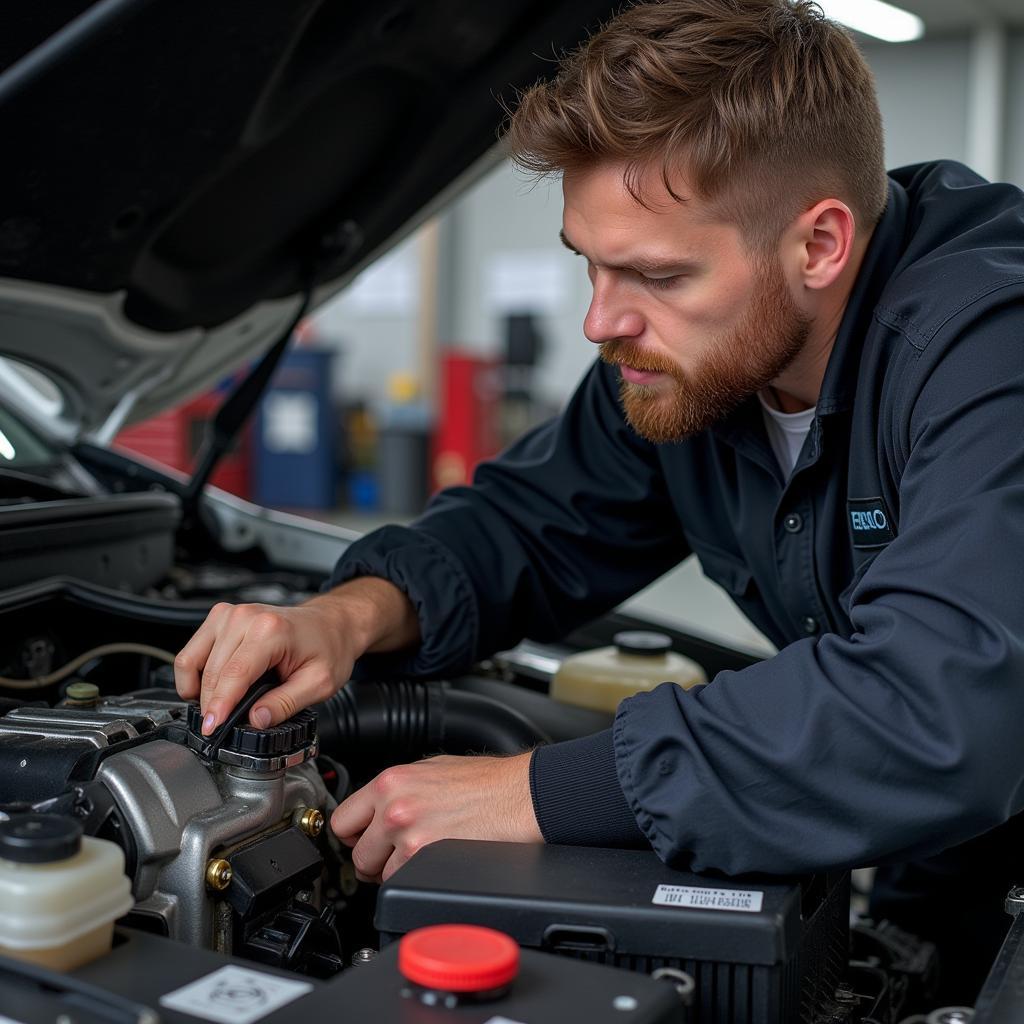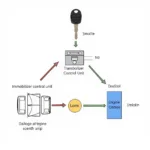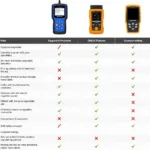The OBD2 code P0171, signaling a “System Too Lean Bank 1,” can be a frustrating discovery for any car owner. This code indicates that the air-fuel mixture in your engine’s combustion chamber is off, with too much air compared to fuel. This guide will help you understand why this code appears and how to address it effectively.
Understanding OBD2 Code P0171
Before diving into solutions, it’s crucial to understand what causes the P0171 code. In essence, your car’s engine needs a precise blend of air and fuel for optimal performance. A lean condition means there’s too much air or not enough fuel in this mix. While a slightly lean mixture can enhance fuel economy, an excessively lean one can lead to performance issues and even engine damage.
Common Causes of P0171 Code
A range of issues can trigger the P0171 code. Here are some of the most common culprits:
- Vacuum Leaks: A leak in the intake manifold, vacuum hoses, or other components can disrupt the air-fuel ratio.
- Faulty Oxygen Sensor (O2 Sensor): The O2 sensor measures the oxygen content in the exhaust to adjust the air-fuel mixture. A malfunctioning sensor can lead to inaccurate readings and a lean condition.
- Mass Air Flow (MAF) Sensor Issues: The MAF sensor measures the amount of air entering the engine. A dirty or faulty MAF sensor can cause the engine to receive incorrect air measurements.
- Fuel Filter Clogs: A clogged fuel filter restricts fuel flow, leading to a lean mixture.
- Fuel Pump Problems: A weak or failing fuel pump may not deliver sufficient fuel pressure.
- Fuel Injector Malfunction: A clogged or faulty fuel injector can disrupt the fuel spray pattern and cause a lean condition in a specific cylinder or bank.
Diagnosing the P0171 Code
Fixing the P0171 code requires pinpointing the root cause. Here’s a step-by-step approach:
- Read the OBD2 Codes: Start by connecting an OBD2 scanner to your car’s diagnostic port and retrieve the stored codes.
- Inspect for Vacuum Leaks: Visually examine vacuum hoses for cracks, loose connections, or damage. You can also use a carburetor cleaner spray around potential leak points while the engine is idling; changes in engine RPM indicate a leak.
- Check the Oxygen Sensor: Inspect the wiring and connector of the O2 sensor. Consider testing the sensor’s voltage output using a multimeter.
- Inspect the MAF Sensor: Carefully remove the MAF sensor and inspect it for dirt or debris. Clean it with a MAF sensor cleaner if necessary.
- Examine the Fuel System: Check the fuel filter, fuel lines, and fuel pump for any signs of blockage or damage.
Fixing the P0171 Code: Step-by-Step Solutions
Once you’ve identified the underlying cause, you can proceed with the appropriate repair:
- Repair Vacuum Leaks: Replace cracked or damaged vacuum hoses, tighten loose connections, or reseal leaking areas.
- Replace the Oxygen Sensor: If the O2 sensor is faulty, it needs replacement. Ensure you use a compatible sensor for your vehicle model.
- Clean or Replace the MAF Sensor: Clean the MAF sensor with a specialized cleaner. If cleaning doesn’t resolve the issue, replacement might be necessary.
- Replace the Fuel Filter: A clogged fuel filter should be replaced with a new one.
- Address Fuel Pump Issues: Test the fuel pump pressure and replace the pump if it’s not functioning correctly.
- Repair or Replace Fuel Injectors: Clean clogged injectors or replace faulty ones.
Preventing Future P0171 Codes
While fixing the current issue is crucial, prevention is key. Here are some tips:
- Regular Maintenance: Follow your vehicle’s recommended maintenance schedule, including regular oil changes, air filter replacements, and fuel system inspections.
- Quality Fuel: Using high-quality fuel and avoiding contaminated fuel can prevent injector clogging and other fuel system issues.
- Timely Repairs: Address any engine-related issues promptly to prevent them from escalating and causing further damage.
When to Seek Professional Help
While some P0171 fixes can be DIY-friendly, it’s essential to acknowledge your limitations. If you’re uncomfortable with car repairs or lack the necessary tools and expertise, it’s best to consult a qualified mechanic.
 Professional Mechanic Addressing P0171 Code
Professional Mechanic Addressing P0171 Code
Conclusion
The OBD2 code P0171 can be a sign of various underlying engine problems. By understanding its causes, utilizing proper diagnostic techniques, and implementing the right solutions, you can restore your car’s performance and prevent potential engine damage.
Remember, regular maintenance and timely repairs are vital for avoiding the recurrence of the P0171 code and ensuring your vehicle’s longevity. If you encounter this code, don’t hesitate to take action and address the issue promptly.

